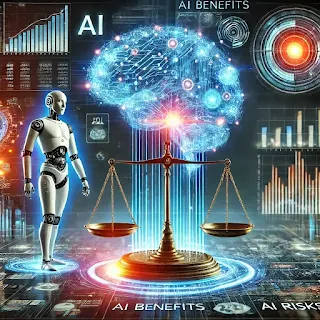Demystifying AI: What It Is and Why It's Important
- Get link
- X
- Other Apps
Demystifying AI: What It Is and Why It's Important
Introduction
Artificial Intelligence (AI) is transforming the world, shaping industries, and influencing daily life in ways we never imagined. From virtual assistants like Siri and Alexa to complex medical diagnostics and self-driving cars, AI is at the forefront of technological advancement. But what exactly is AI, and why is it so important? This article explores these questions, addressing the most common queries Americans have about AI, based on Google Trends and popular searches.
What Is AI?
 |
A conceptual illustration of AI using machine learning and neural networks |
AI, or artificial intelligence, refers to computer systems that can mimic human intelligence by learning from data, making decisions, and performing tasks that typically require human cognition. According to TechTarget, AI can be classified into two main types:
1. Narrow AI
This type of AI is designed to perform specific tasks, such as facial recognition, voice assistants, and recommendation algorithms. Examples include Netflix’s personalized recommendations and self-driving technology in Tesla cars.
2. General AI
A theoretical concept, General AI would be as intelligent as a human, capable of reasoning, learning, and adapting across different domains. While it remains a future possibility, researchers continue to explore ways to achieve this milestone.
How AI Works
AI operates using various technologies, including:
Machine Learning (ML) – Algorithms that learn from data patterns to make predictions.
Deep Learning – A subset of ML using neural networks to process vast amounts of information.
Natural Language Processing (NLP) – Enables machines to understand and respond to human language.
Computer Vision – AI's ability to interpret and analyze visual data, such as identifying objects in photos.
Why Is AI Important?
 |
| An AI-powered robotic assistant optimizing business processes and automation |
AI is not just a buzzword; it plays a crucial role in transforming industries and solving real-world problems. Here’s why AI is significant:
1. Enhancing Efficiency and Productivity
AI automates repetitive tasks, freeing human workers to focus on creative and complex work. In manufacturing, robots assemble products with precision and consistency. AI-driven chatbots in customer service handle inquiries 24/7, reducing wait times.
2. Data-Driven Decision Making
AI analyzes massive datasets faster than humans, identifying patterns and trends. In finance, AI detects fraud by analyzing transaction anomalies. In healthcare, it predicts disease outbreaks by studying medical records and symptoms.
3. Personalization and Customer Experience
Companies like Amazon and Netflix use AI to recommend products and movies based on user behavior. Personalized content keeps users engaged and improves satisfaction.
4. Healthcare Advancements
AI assists doctors in diagnosing diseases, developing new drugs, and performing robotic surgeries. IBM Watson Health uses AI to analyze medical data and suggest treatments.
5. Environmental and Sustainability Solutions
AI optimizes energy use in smart grids, predicts climate changes, and aids in wildlife conservation. It helps companies reduce waste and carbon footprints, contributing to sustainability.
6. Economic Growth and Job Creation
AI is projected to contribute $15.7 trillion to the global economy by 2030 (PwC). While AI may replace some jobs, it will also create new roles in AI development, maintenance, and ethical oversight.
Ethical Considerations and Challenges
 |
| A visualization of AI ethics, showcasing bias and data privacy concerns |
While AI brings numerous benefits, it also raises ethical concerns that must be addressed.
1. Job Displacement
Automation threatens jobs in industries like retail and manufacturing. However, retraining programs can help workers transition to AI-related roles.
2. Bias in AI
AI models can inherit biases from training data, leading to discrimination. For instance, biased hiring algorithms may favor certain demographics. Transparent AI development and diverse datasets can mitigate this issue.
3. Data Privacy and Security
AI relies on vast amounts of personal data, raising concerns about privacy. Strong regulations and ethical AI development practices are needed to protect users.
4. Environmental Impact
Training large AI models requires immense computational power, increasing carbon emissions. Companies must adopt energy-efficient AI technologies to minimize their footprint.
The Future of AI
As AI evolves, it will continue shaping industries and society. The key to responsible AI development lies in ethical considerations, transparency, and collaboration between governments, businesses, and researchers. Staying informed about AI advancements ensures we harness its potential while mitigating its risks.
Conclusion
AI is a powerful technology with transformative potential across industries. From healthcare and finance to sustainability and customer experiences, AI enhances efficiency, decision-making, and innovation. However, ethical challenges like bias, privacy, and job displacement must be addressed for responsible AI adoption. As AI continues to evolve, its impact on society will depend on how we choose to develop and implement it.
- Get link
- X
- Other Apps




Comments
Post a Comment